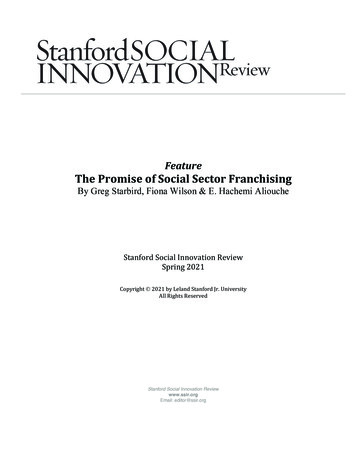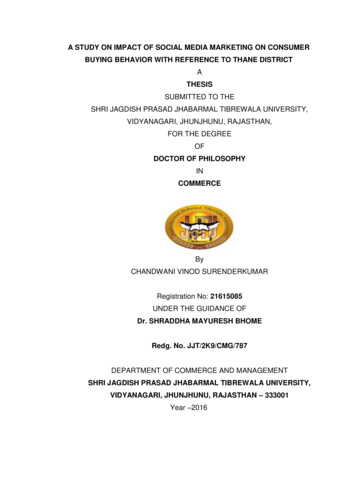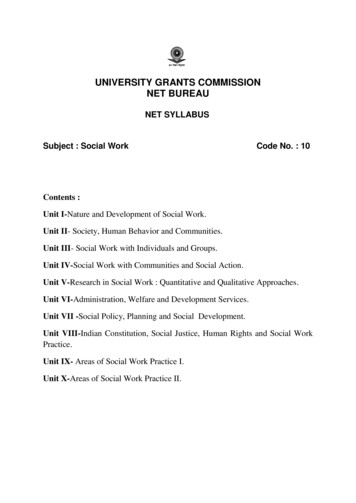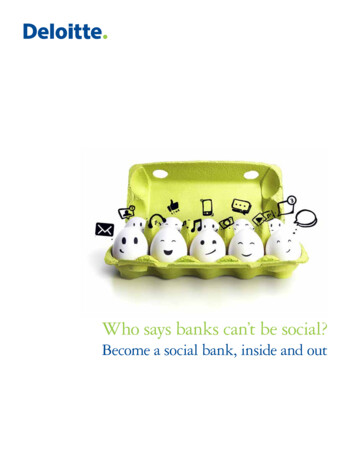
Transcription
FeatureThe Promise of Social Sector FranchisingBy Greg Starbird, Fiona Wilson & E. Hachemi AlioucheStanford Social Innovation ReviewSpring 2021Copyright Ó 2021 by Leland Stanford Jr. UniversityAll Rights ReservedStanford Social Innovation Reviewwww.ssir.orgEmail: editor@ssir.org
42Stanford Social Innovation Review / Spring 2021The massive growth of commercial franchises like McDonald’s offers inspiration for scaling social, impact. Although still very young, social sector franchising is spawning an array of successful enter-prises that offer lessons for further expansion.The Promiseof Social SectorFranchisingBY GREG STARBIRD, FIONA WILSON& E. HACHEMI ALIOUCHEIn his January 2019 Stanford Social Innovation Review article, “To Impact Millions, the Social Sector Needs to ScaleScaling Up,” consultant Greg Coussa writes: “The ‘scalesector’—the practices, people, and policies that makeup the efforts to exponentially boost an organization’simpact—is woefully under-resourced and nascent.” This scalingcrisis threatens the loftiest aspirations of the social sector. How,for instance, will we even begin to approach the United Nations’Sustainable Development Goals (SDGs)—the 17 goals the UnitedNations General Assembly set to “achieve a better and more sustainable future for all” by 2030—without first figuring out howto dramatically expand the impact of our most promising ideas?How will we try to eliminate poverty (SDG 1) and hunger (SDG2), ensure good health and well-being (SDG 3), create quality education (SDG 4), establish gender equality (SDG 5), provide cleanwater and sanitation (SDG 6), and produce affordable and cleanenergy (SDG 7) for the whole world if we cannot take whateverlimited successes the social sector has seen along these lines andmultiply them a thousandfold?While the so-called “scale sector” may be under-resourced andnascent, social sector franchising is emerging as a promising approachto multiplying the impacts of social enterprises. Commercial franchising has a proven record of catalyzing business expansion. Sociallyminded entrepreneurs have begun turning to this model in hopes ofachieving analogously large-scale growth and thereby exponentiallyboosting their social impact.Imagine a world with massive numbers of franchises all overthe world delivering standardized medical care, potable water,education, and clean energy, rather than hamburgers and frenchfries. If the success of commercial franchising could be harnessedfor positive social impact, the benefits would be immense. Theywould include improved access to products and services for tensPhoto by Daniel Macharia courtesy of Kidogo
Stanford Social Innovation Review / Spring 2021of millions of people; ownership opportunities at the base of thepyramid (BoP) for tens of thousands of franchisees; creation of jobsfor hundreds of thousands of people employed by franchisees andfranchisors; and spillover benefits, such as healthy pressure on localsuppliers to improve the quality of their products and services toa level high enough to win contracts to supply franchise networks.To be sure, multiple obstacles stand in the way of social sectorfranchising reaching its full potential. The practice is still fairlyrecent, and as practitioners, capital providers, governments, NGOs,and researchers learn more about it, solutions will emerge to overcome these obstacles. This article is an effort in that spirit.Through the University of New Hampshire’s Social SectorFranchise Initiative, the authors had the opportunity to examinethe experiences of several social sector franchises. All of us wereclosely involved as lead organizers of this program and as selectorsand ongoing mentors of the participants. The initiative matched 13social sector franchises with franchising experts in an eight-monthexecutive mentorship program and convened three annual roundtables featuring a diverse cross-section of social sector franchiseentrepreneurs, commercial franchise experts, impact investors,and philanthropists, plus academic researchers and select students.Through this initiative, the authors examined the experiences ofsocial sector franchises in different industries and countries.! Children enjoy outdoor time atIn what follows, we highlightone of Kidogo's childcare centers inNairobi, Kenya.common issues that social sec-43
44Stanford Social Innovation Review / Spring 2021tor franchises face operating across these different environments,and make special reference to four specific enterprises. We focuson the experiences of these franchises from different sectors toidentify successes, challenges, and lessons that may inform thisfledgling field.REPLICATION WITH ADVANTAGESAny entrepreneur or organization whose operating model is alreadydelivering social impact on a small scale faces a choice of how toscale that impact. One option is replication, and franchising is butone way to replicate social impact.“Finding ways to scale an organization’s impact without scaling itssize is the new frontier in the field of social innovation,” Bridgespanmanaging partner and cofounder Jeffrey Bradach wrote in 2010.1 Theensuing decade has spawned vast literature on scaling. Without offering an exhaustive catalog, we can simplify into four groups the optionsresearchers and practitioners have pinpointed. First, an organizationcan replicate a successful operating model, including franchising andother methods that offer varying control and enforcement of standards in applying the model. These include licensing, organic growththrough company-owned locations, mergers and acquisitions, andjoint ventures. Second, it can align looser networks of independentorganizations toward a desired outcome in a specific industry, such asagriculture, health care, or energy production. The organization cando so by providing central know-how, services, or supplies, spreading programmatic similarities with little programmatic control (e.g.,cooperatives and certification programs). Third, the organizationcan disseminate know-how in some other way, such as by providingtraining, consulting, or publishing lessons or tools, or by inventing anapp. Fourth, the organization can advocate for policy change using asuccessful demonstration or flagship operation.For organizations that take the replication path as their wayof scaling social impact, franchising offers several advantages. Itprovides a proven operating model with defined systems and processes, delivering a standardized product and/or service; it offersa common brand with trademark(s), owned by the franchisor andlicensed to the franchisees, along with the operating system; andit generates fees that the franchisees pay to the franchisor for useof the brand, marks, and system, and for support services that thefranchisor provides for the franchisees, such as training, qualitycontrol, advertising, and marketing.Franchisees generally contribute capital, entrepreneurial skills,and local market knowledge. Franchisees may find joining a franchise system attractive because it allows them to go into businessfor themselves but not by themselves, as the franchise system offersa proven turnkey business that comes with support from the franchisor. Franchising is thus a powerful model to scale up a business.The modern form of commercial franchising took off in 1950sAmerica with the launch of companies such as McDonald’s and KFC,which are dominant franchisors today. The franchising sector hassince achieved tremendous scale and economic impact, reachingmore than 800,000 franchised locations in the United States andsupporting 8.9 million jobs, according to the International FranchiseAssociation (IFA). Beyond quick-service restaurants for which commercial franchising is most known, large franchise networks exist ina wide variety of industries, including tax preparation, health care,GREG STARBIRD is principal of Starbird Consulting, which catalyzes entrepreneurs, companies, philanthropists, and nonprofits to useinnovative business models and technologiesto distribute life-enhancing goods and servicesto broad populations. Prior to foundingStarbird Consulting in 2016, he served as CEOof The HealthStore Foundation, whose Childand Family Wellness franchise network of clinics in Kenya has served more than five millionpeople with lifesaving medicines and healthcare. He also served on the advisory board ofthe Social Sector Franchise Initiative at theUniversity of New Hampshire and mentoredsocial sector franchisors in the program.FIONA WILSON is the deputy chiefsustainability officer for the University of NewHampshire, director of UNH’s SustainabilityInstitute, and an affiliate associate professorat UNH’s Peter T. Paul College of Businessand Economics. Previously, she was executivedirector of UNH’s Center for Social Innovationand Enterprise, a lead partner in UNH’s SocialSector Franchise Initiative.E. HACHEMI ALIOUCHE is the director ofthe Rosenberg International Franchise Centerat the University of New Hampshire’s PeterT. Paul College of Business and Economics,where he is an associate professor and holdsthe Rosenberg Chair in Franchising. His currentresearch focuses on franchise finance, international franchising (particularly in emergingcountries), and social franchising. Prior tojoining UNH as a full-time faculty member, heheld senior-level management positions withseveral global companies and founded entrepreneurial ventures in health care, investmentmanagement, and consulting.Acknowledgments: The Social Sector Franchise Initiative is a collaborative undertakingat the University of New Hampshire betweenthe Rosenberg International Franchise Center(a program of the Peter T. Paul College ofBusiness and Economics) and the Center forSocial Innovation and Enterprise (now theChangemaker Collaborative), a joint venturebetween the Sustainability Institute, the PeterT. Paul College of Business and Economics, andthe Carsey School of Public Policy. The International Franchise Association is a key externalpartner. We are grateful to our lead funder whomade this initiative possible, the Peter T. PaulInnovation Fund at the Peter T. Paul College ofBusiness and Economics at the University ofNew Hampshire.Many thanks to those whom we interviewedfor this article and who provided useful insightsand feedback on earlier versions and drafts.These include Kim Alter, Lindsey Barari, FerenzFehrer, Sabrina Habib, Mike Hardin, NealHarrison, Peter Holt, Lori Kiser, Dave Koch, BillMaddocks, Julie McBride, Kevin McKague, BethMeadows, Jason Phillips, Marla Rosner, CesarBuenadicha Sanchez, Lynda Toussaint, andGalen Welch.cleaning services, senior care, auto services, real estate, hotels, fitness, and car rentals.There is no one-size-fits-all approach to franchising that ensuresrapid or successful scaling. Franchisors differ wildly in their practices, including in terms of how they structure, document, andenforce deal terms with franchisees, and how they deliver supplies,training, and services for franchisees. While the best franchisesoffer inspiring examples of scale, some franchises, just like any othermethod of distribution, fail.For the purposes of this article, we define franchising as a relationship between a franchisor and franchisee in which the franchisee acts as an independent operator with vested interest, workingunder and building a common brand and using an operating modelprescribed by the owner of the brand, the franchisor, and payingthe franchisor in some way for the continued rights to operateunder the brand or system. We are particularly interested here inapplications of business format franchising (as opposed to productdistribution franchising or fractional franchising). In business formatfranchising, a brand owner (franchisor) licenses to independententrepreneurs (franchisees) a business format—a branded systemof delivery—rather than only specific products or services (as inproduct-distribution franchising, such as auto dealerships or bottling companies). A franchised business format includes licensingthe use of the brand, standardized operating procedures, designand merchandising specifications, accounting methods, advertising activities, and so on. Business format franchising is nowthe most common form of commercial franchising in the UnitedStates, accounting for almost 11 times as many establishments asproduct-distribution franchising and providing almost six times asmany jobs, according to the IFA.
Stanford Social Innovation Review / Spring 2021The idea of applying franchising to the social sector is not new.2Researchers have analyzed and categorized socially focused franchising under such rubrics as social franchising, social sector franchising,fractional franchising for social purposes, and microfranchising. Forthe purpose of this article, to qualify as a social (or social sector)franchise, the franchise must consider social impact its primaryintention; it is not sufficient to have only incidental social impact,such as job creation or economic development that might accompany a commercial franchise. Unlike business franchises, socialsector franchises are driven by their social mission, which regularlyaffects critical choices they make about products, services, customers, employees, themselves, and their franchisors.Social sector franchises often do not fit cleanly into the categoryof “for profit” or “nonprofit.” They seek financial returns but primarily as means to achieve social impact, and they target human needs,rather than simply consumer desires. Social sector franchisors oftenplay dual roles—e.g., operating as an investable franchisor companywhile simultaneously and passionately raising grants and donationsto facilitate the social impact the franchise is designed to make. Thisapproach leads to hybrid organizational forms with a double bottomline of financial and social returns.All franchisors—social sector or commercial—seek the profitability of their franchisees. But while both types of franchisors accept thatunit-level profitability is the cornerstone of a sustainable franchisedbusiness, social sector franchisors often hold franchisor-level profitability as a long-term goal and in the meantime sustain the franchiseby using grants and donations to supplement whatever percentage ofcosts the franchisor can recover from franchisees. Some social sectorfranchisors go further and consider such external funding a permanent state—i.e., they do not seek franchisor profitability solely throughmoney flowing up through their franchise network.FOUR PROMISING FRANCHISESA number of social sector franchises have launched over the past twodecades and are having significant impacts on communities aroundthe world. Examples of promising social sector franchises bringingvital products and services to low-income populations include Jibu,Mercado Fresco, Unjani Clinics, and Kidogo. All four enterprisesparticipated in the University of New Hampshire’s Social SectorFranchise Initiative. We have chosen to highlight these four companies as representative of the state of the field, and we also includegeneral insights from other participants.The first, Jibu, equips emerging market entrepreneurs to createaffordable access to drinking water and other necessities. RandyWelsch and Galen Welsch, father and son, cofounded the enterprisein 2012 after Galen’s stint in the Peace Corps and Randy’s exit froma long career in the tech industry. While neither Randy or Galenknew the water sector, both had experience in sub-Saharan Africaand a passion for how to unleash the latent potential of local entrepreneurs to serve basic necessities.For an investment of 2,500-4,500, franchisees are equipped withJibu’s water-purification and other equipment, branding, training,and the capital required to launch franchised locations selling drinking water at prices competitive with that of the charcoal it wouldcost to boil it. The franchise seeks to create profitable businesses forlocal entrepreneurs, employing numerous people in each communityit serves while promoting social well-being, mobility, and agency fornew business owners. Jibu franchise locations sell drinking water inreusable containers. Customers pay an initial deposit for the reusable water bottle, then pay only for the water when exchanging anempty container for a full bottle.Before becoming active franchisees, potential franchisees beginas microfranchisee distributors of an existing franchisee. Approximately 700 microfranchisees are currently competing to becomefranchisees; Jibu picks its next franchisees from the best-performingmicrofranchisees. A L3C (low-profit limited liability company) witha US 501(c)(3) nonprofit partner, Jibu has launched 134 franchises inseven countries (Burundi, Kenya, Tanzania, Rwanda, Uganda, Democratic Republic of Congo, and Zambia), has distributed more than190 million liters of water, and serves 2,248 retail points.Mercado Fresco is a Nicaraguan franchise that makes quality,affordable food accessible to low-income communities. It operatesin two formats: The first uses stores located in the homes of femalemicrofranchise operators, and the second, carts wheeled around thecity (Fresco Express). Products include fresh dairy; vegetables; bread;and traditional foods, such as rice, beans, and nacatamales, a Nicaraguan staple dish. Mercado Fresco teaches operators everything fromproper food handling to customer service to money management andgives them equipment, including food baskets, signs, and calculators.Mercado Fresco envisions long-term franchisor profitabilitythrough scale. The enterprise now has 95 stores in operation acrossNicaragua. Through the commission that franchisees earn from theirstore sales, Mercado Fresco has helped raise local incomes from 0to 2 per day to 4 to 10 per day.Unjani Clinics is a South African network of nurse-led primarymedical clinics housed in specially outfitted shipping containers.The enterprise aims to enhance access to quality, affordable primaryhealth care. By placing the clinics in the community (at the pointof need), Unjani reduces travel distances and time, decreasing costand increasing convenience for patients. In addition, it empowersBlack women professional nurses to operate and ultimately own asustainable microenterprise and creates permanent employment intownships and rural communities.Incorporated as a South African nonprofit company, Unjani Clinics raises funding for the 67,000 start-up investment per clinic forinfrastructure and equipment and covers the initial cost of trainingthe nurse and clinic staff. Unjani gives operational donations (working capital) to the nurse for the first two years of operation, untilthe clinic reaches financial viability. The nonprofit company alsoimplements, trains, and manages both the program and the standardprocurement processes, and negotiates prices for all clinics. Unjaniand the nurse sign a five-year enterprise development agreement(EDA) that governs the relationship and details the responsibilitiesof each party. The nurse is the operational owner of the clinic fromday one, but title ownership transfers only after the five-year period,based on EDA compliance.Corporate Enterprise Development (a South African governmentprogram run through the Department of Trade and Industry), UnjaniClinics’ primary partners (including Imperial Logistics, Johnson &Johnson, Pfizer, AECI, The ELMA Foundation, and the Jobs Fund,which is an initiative of South Africa’s National Treasury), andindividual donors have provided the funding to set up the current45
Stanford Social Innovation Review / Spring 2021network. Unjani charges a network fee to the clinics to cover someof its operating costs. The monthly network fee escalates over thefive-year period but is capped at 4 percent of clinic revenue. Thenetwork currently consists of 80 clinics, which have performed1,667,165 consultations since 2013.Kidogo, which means “small” in Swahili, gives families living inKenya’s low-income communities access to high-quality, affordablechildcare. Incorporated as a company limited by guarantee (CLG)in Kenya with a US 501(c)(3) nonprofit partner, the enterprise teamsup with local women (“mamapreneurs”) to help them either startor grow their own childcare microbusinesses.Prior to joining the Kidogo network, women typically operatetheir own informal daycares (approximately 3,500 makeshift daycares exist in Nairobi’s urban slums alone) but struggle with qualitycontrol and business management. Kidogo supports mamapreneurs(often women with only a primary-school education level) to runfirst-rate microbusinesses while earning a sustainable livelihood.It provides training in early childhood development and entrepreneurship, followed by continuous coaching, professional development workshops, and peer-to-peer support sessions.Kidogo has established clear quality standards through a checklist that is simple to use and that generates ratings for each center,which are mapped to the six elements of the Kidogo Way, the organization’s proprietary approach to running a quality childcare center.All training, coaching, and support tools are based on these sameelements. Mamapreneurs are encouraged to do a self-assessmentevery two weeks. Franchising officers also do an assessment duringtheir coaching visit. The monitoring and evaluation team does random spot checks using the same checklist at least once a quarter toverify results. The process is mobile-phone based, generating realtime information on the mamapreneurs.Upon meeting Kidogo’s quality standards, mamapreneurs areoffered the opportunity to become franchisees, which gives them useof a management app and the Kidogo brand. The start-up investmentper unit is 250- 1,000, including a renovation of the center. Almost allcenters are 10-by-10-foot corrugated metal shacks with limited lightingand ventilation; renovations include adding a roof skylight, a window,and a mirror to visually expand the size of the room; providing a rug,as well as hand-washing and drinking-water containers; creating awooden partition to separate the cooking area from the play area; andpainting the space to make it more engaging. Kidogo also gives eachcenter a starter kit with basic play materials. Through the network,Kidogo is improving the quality of care for young children while supporting working mothers to rejoin the workforce with peace of mind.The leaders of these four organizations have used franchising—each in their own way—as a method of expansion and have significantly increased their social impact. Jibu has distributed almost 200million liters of water. Mercado Fresco is operating close to 100 stores,providing affordable food and higher incomes. Unjani has performedmore than 1.5 million consultations. Kidogo has close to 150 mamapreneurs in its network and is now Kenya’s largest childcare chain. Butsuch growth did not come easily; these franchises overcame numeroushurdles while building their networks and client base.NOT AN EASY PATHWe identified several major challenges that social franchises havefaced through our research into these four and other participants inthe University of New Hampshire’s Social Sector Franchise Initiative. Note that we have decided to focus on the challenges unique tofranchising and set aside other potential challenges, such as politicalinstability, armed conflict, or natural disaster.Lack of familiarity with franchising Social sector franchisors oftenoperate in places where franchising is not prevalent, such as ruralareas and slums in low-income countries. The lack of clear models makes establishing clear expectations for franchisees difficult.Financing for franchisees In commercial franchising, franchisees (not franchisors) supply financing to open franchised units.Distributed ownership is fundamental to franchising. But manysocial sector franchisors find that their franchisees have no sourceof start-up capital. Banks are leery of lending to franchisees without relevant credit histories and collateral. This is perhaps the mostserious obstacle to scaling for social sector franchises.Franchisee candidates To scale rapidly and significantly, social sector franchisors need a pipeline of qualified potential franchisees whohave the entrepreneurial drive and skill to build an independent, viablebusiness under the franchise system. But social sector franchisors serving low-income communities face major obstacles here, in addition tolack of financing sourced by franchisees. Highly educated franchiseecandidates from middle-class communities often do not find it financially attractive to serve lower-income communities (and sometimesfeel unsafe doing so or are badly positioned culturally to gain the trustof local customers); franchisee candidates from within low-incomecommunities often lack basic skills (such as literacy, numeracy, accounting, and sales), likely have never encountered a franchise (evenas consumers), and may be frequently disrupted by familial, social, oreconomic issues while operating as franchisees. It is not uncommonfor franchisees of Mercado Fresco, for example, to face domestic violence or abuse and associated mental and physical health challenges.Customer purchasing power and culture Customers targeted bysocial sector franchises—including all those featured in this article—often have little cash to spare and often have incomes that waxand wane seasonally, or that are disrupted by urgent family needs(school fees, weddings, funerals, etc.) or by increases in the priceof basic necessities, such as food. This instability can undercut thesales of franchised units, in turn threatening franchisors’ ability togenerate royalties and fees necessary to sustain the overall business.Furthermore, customers may technically need goods and servicesthat the franchise considers its core offerings (such as potable water) but hesitate to use limited cash to pay for them.Enforcing standards All four franchisors featured in this articleset and enforce brand standards and equip franchisees to followthem. However, in various jurisdictions where they and other suchfranchisors (and their franchisees) operate, it is impractical or ineffective to send franchisees a default letter, terminate their contract,or take them to court. It can also be challenging to write a franchiseagreement that is legally defensible and yet fair to franchisees withlimited ability to comprehend lengthy legal documents. And it canbe costly to operate an effective compliance system. Lastly, whencontemplating revoking a franchisee’s rights when the franchisee hasegregiously violated the franchise agreement, social sector franchisors sometimes worry that they will harm a local community, whoseservice may be disrupted.PHOTOS COURTESY OF UNJANI CLIICS (TOP) AND JIBU46
PHOTOS COURTESY OF UNJANI CLIICS (TOP) AND JIBUStanford Social Innovation Review / Spring 2021Provision of franchise services and products Social sector franchisors often face difficulties in standardizing build-outs of franchisedunits, because many franchisees work in contexts without consistentaccess to standardized building materials or reliable contractors. Siteselection can also be problematic because of lack of market data, negotiations with landlords, unreliable quality of buildings, and lack ofeffective legal recourse in case of a dispute. Poor roads, inconsistentsuppliers, and disproportionate expenses to distribute goods to thelast mile can also make the franchise supply chain unreliable.Friction with government(s) Social sector franchises often dothings that overlap with government functions, such as providingdrinking water (Jibu) or healthcare (Unjani). Social franchises! Top: Unjani Clinics uses speciallyoutfitted shipping containers to procan therefore find themselvesvide health care. Bottom: Jibu franin high-stakes discussions withchises sell drinking water in reusableregulators, waiting for permits,containers.navigating the changing landscapes of political administrations, giving and receiving political influence, or negotiating partnerships.This is complicated territory and introduces various risks.Lack of legal framework Without a basic legal framework definingand authorizing franchising to take place in a country, authoritiesencountering social sector franchises often lack straightforwardanswers to questions about taxation (Do you tax the franchisee,the franchisor, or both?), permitting, or who has the authority tospeak for the business operating on the premises in case of a leasedispute. Commercial franchisors share this challenge.Economic disparity Social sector franchisors must often carryout some functions in large cities, which give them access to highlyeducated personnel, key suppliers, funders, and regulators. But thecost of living in such settings is often an order of magnitude higherthan in slums or rural areas served by social sector franchisees. Thissteep difference makes it difficult to pay central franchisor costswith royalties and fees generated from franchisees; franchisors and franchisees are effectivelyoperating in different economies.Taken together, these challenges to socialsector franchising become incredibly tricky.Franchises must juggle multiple salient components simultaneously and craft solutions locallyto account for a host of obstacles. Furthermore,many commercial franchise networks scale notonly via franchisees who own one or two unitsbut via territory-specific developers, multiunitfranchisees, or master franchisees, who mightown tens or hundreds of units. But who wantsto buy master franchise rights to a brand thatlacks ready access to financing for franchisees,that faces regulatory risks in each new regionwhere it operates, or that depends on piecemealexternal subsidies to guarantee sufficient profitability? Finally, the same limited collection ofentrepreneurs with the financial and businessacumen to consider buying rights to expand asocial sector franchise also usually have oppo
chisor. Franchising is thus a powerful model to scale up a business. The modern form of commercial franchising took off in 1950s America with the launch of companies such as McDonald’s and KFC, which are dominant franchisors today. The franchising sector has sinc











